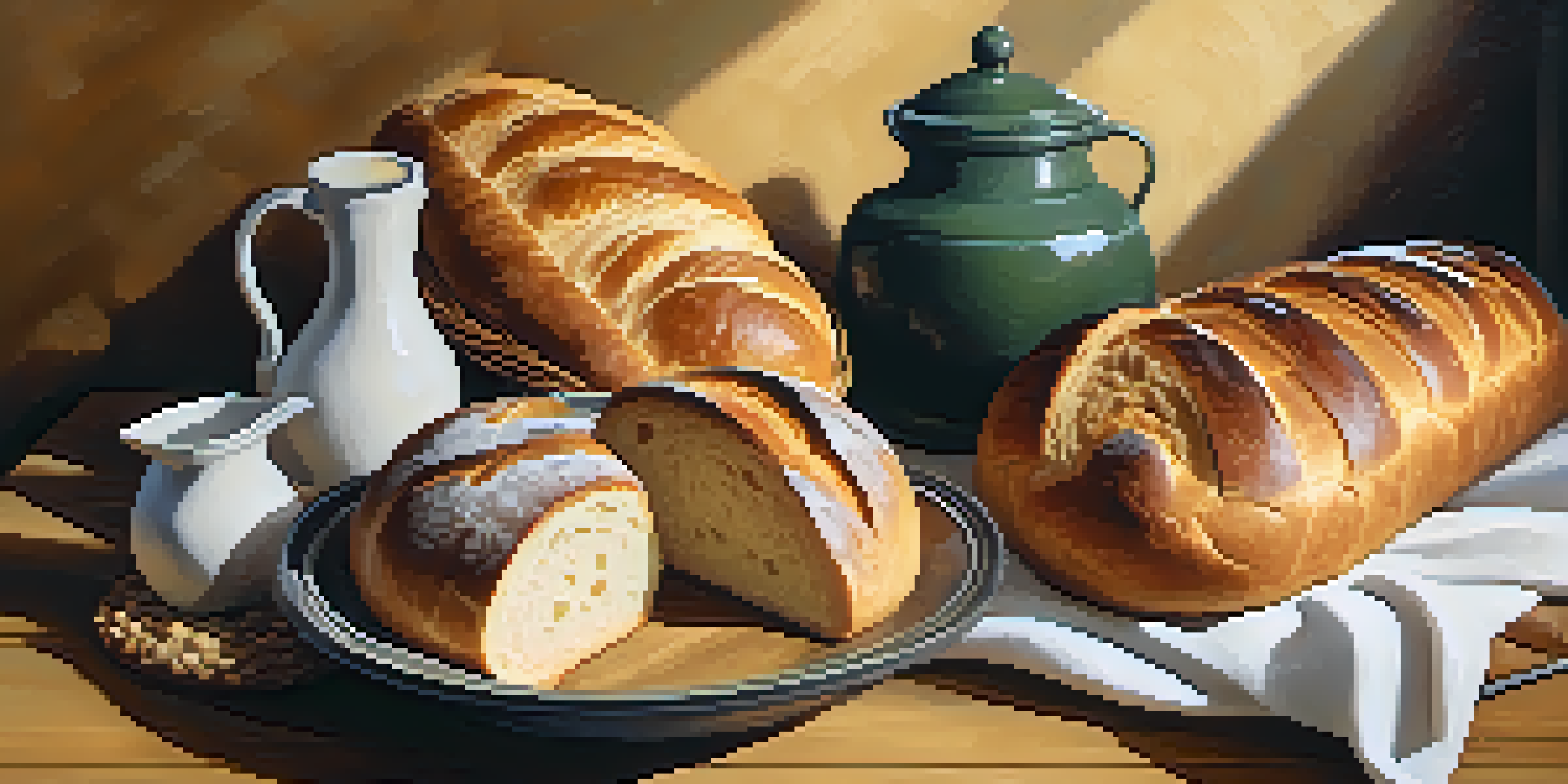The Symbolism of Bread in Various Spiritual Traditions

Bread as a Universal Symbol of Nourishment
Bread is often seen as a fundamental source of sustenance, representing both physical and spiritual nourishment. In many cultures, it is a staple food that fuels daily life, making it a powerful symbol of survival and community. The act of sharing bread can bring people together, fostering connections that transcend individual needs.
Bread is the staff of life.
Beyond its physical properties, bread embodies the idea of abundance and prosperity in spiritual practices. It signifies the blessings of nature and the hard work of those who cultivate the land. This duality of bread as nourishment for the body and soul highlights its importance in the human experience.
In many traditions, bread is more than just food; it is a sacred symbol. For instance, in Christianity, the breaking of bread during Communion represents the body of Christ, emphasizing the spiritual bond between believers. This illustrates how bread serves as a bridge between the earthly and the divine.
Bread in Ancient Cultures and Rituals
Throughout history, bread has played a significant role in various ancient cultures. In Mesopotamia, for example, bread was not only a primary food source but also a sacred offering to the gods. These rituals often involved baking specific types of bread to honor deities, reflecting the belief that bread connects humans to the divine.

Similarly, ancient Egyptians regarded bread as a symbol of life and resurrection. They believed that bread was a gift from the gods, and it was often included in burial rites to nourish the deceased in the afterlife. This practice illustrates how bread transcends mere sustenance, embodying a connection to spirituality and eternity.
Bread as a Symbol of Community
Bread serves as a powerful symbol of connection and unity across various cultures and spiritual practices.
Even in the indigenous cultures of the Americas, bread has held a sacred place in rituals. Cornbread, for instance, is made from maize, a staple crop that is deeply intertwined with their spiritual beliefs. This highlights the importance of bread as a cultural and spiritual artifact that reflects the values and beliefs of a community.
The Role of Bread in Christianity
In Christianity, bread is a central element of the Eucharist, symbolizing the body of Christ. This sacred practice emphasizes the idea of sacrifice and unity among believers, as they share in the act of communion. The bread becomes a physical representation of spiritual sustenance, reminding followers of their faith and community.
There is no love sincerer than the love of food.
Moreover, the phrase 'Give us this day our daily bread' from the Lord's Prayer highlights the significance of bread as a metaphor for God's provision. It underscores the belief that spiritual nourishment is as essential as physical sustenance. This connection between bread and divine grace is a powerful reminder of the sacredness of everyday life.
Additionally, the practice of baking bread at home can be seen as a spiritual ritual in itself. Many Christians find comfort and connection with God through the act of kneading dough and baking. This transformation of simple ingredients into something nourishing reflects the alchemy of faith and grace in their lives.
Bread in Jewish Traditions and Festivals
In Jewish culture, bread holds profound significance, particularly during rituals and festivals. Challah, a braided bread, is a staple during Shabbat and other celebrations, symbolizing abundance and the joy of community. The act of blessing and sharing bread during these occasions reinforces the bonds among family and friends.
During Passover, unleavened bread, or matzah, is consumed to commemorate the Israelites' hasty escape from Egypt. This bread symbolizes humility and the importance of freedom. By connecting bread to historical events, it serves as a reminder of faith, resilience, and the importance of remembrance in Jewish tradition.
Spiritual Significance of Bread
In many traditions, bread represents both physical sustenance and spiritual nourishment, highlighting its dual role in human experience.
Furthermore, the tradition of breaking bread during significant life events, such as weddings and funerals, illustrates the role of bread as a symbol of continuity and connection. The sharing of bread during these moments creates a sense of community and support, embodying the spirit of togetherness in both joy and sorrow.
The Significance of Bread in Buddhism
In Buddhism, bread may not hold the same central role as in other religions, but it carries its own unique symbolism. Bread is often associated with the concept of impermanence, reflecting the transient nature of life. Just as bread can be easily broken or consumed, so too can moments of happiness and suffering.
Moreover, the act of sharing food, including bread, is an important practice in Buddhist communities. It fosters generosity and mindfulness, encouraging individuals to appreciate the interconnectedness of all beings. This practice serves as a reminder that nourishing the body feeds the spirit, promoting compassion and empathy.
Additionally, in some Buddhist traditions, offerings of bread and other foods are made to monks as a form of respect and gratitude. This exchange not only nourishes the monks but also cultivates a sense of community among laypeople. The sharing of bread in this context emphasizes humility and the importance of giving.
Bread as a Symbol of Peace and Unity
Across various spiritual traditions, bread often symbolizes peace and unity among people. The communal act of breaking bread together can foster reconciliation and strengthen bonds. This universal gesture transcends cultural differences, reminding us of our shared humanity.
For instance, in many indigenous cultures, the practice of sharing bread during rituals is a sign of hospitality and goodwill. It creates a space for dialogue and understanding, reinforcing the importance of community and connection. This symbolism serves as a reminder that peace begins with simple acts of kindness.
Modern Bread-Making Rituals
Contemporary baking practices transform bread-making into a mindful ritual that fosters self-care and community connection.
In a broader sense, bread can also be seen as a metaphor for acceptance and inclusivity. Just as bread can take many forms and flavors, so too can our relationships with others. Embracing diversity through the shared experience of bread can lead to a greater understanding of each other’s backgrounds and beliefs.
Modern Interpretations of Bread's Spiritual Symbolism
In today's world, the symbolism of bread continues to evolve, reflecting contemporary spiritual practices. Many people now view baking bread as a form of mindfulness and self-care. The process of creating something from scratch can be a meditative practice, allowing individuals to connect deeply with themselves and the present moment.
Moreover, the rise of artisanal bread-making has sparked a renewed interest in the craft of baking. People are not only focused on the end product but also on the journey of creation. This shift emphasizes the importance of intention and the spiritual aspect of cooking, transforming the act of baking into a meaningful ritual.

Many spiritual seekers also explore the symbolism of bread in the context of nourishment for the soul. By engaging in communal meals or participating in bread-baking workshops, individuals find opportunities to connect with others and share their experiences. This modern interpretation of bread as a symbol of community and connection reinforces its timeless significance.